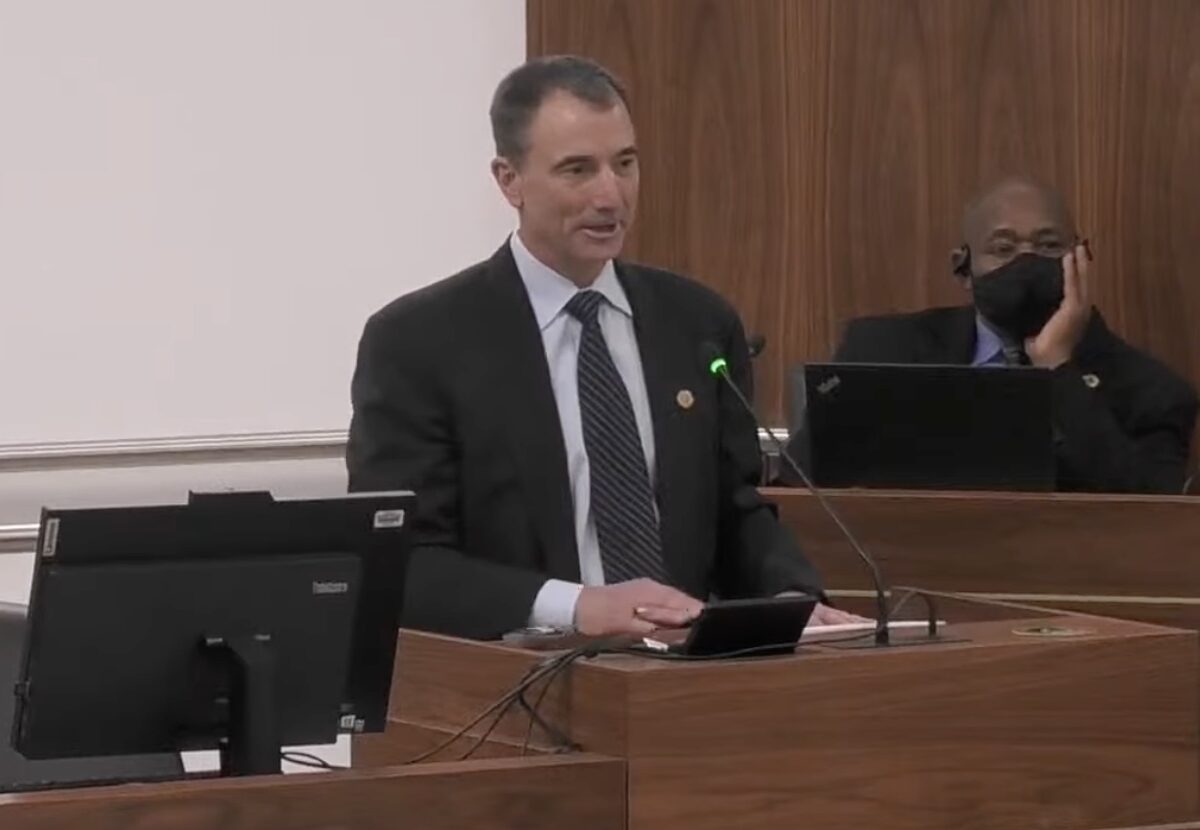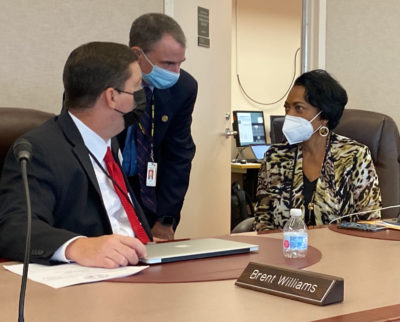

Dear Legislators,
For decades, NC public schools have provided the critical element to lift our state up and make it one of the most attractive places to live, work and raise a family. The competition we face in a global economy creates the need for us to recommit in investing in public schools for the benefit of all North Carolinians.
As the body charged by our constitution with “supervising and administering the free public school system,” the State Board of Education (SBE) brings over 100 years of combined experience serving, managing, challenging and leading public school districts and individual schools across our state. We have personally led the transformation of some of our most challenged schools and brought innovative strategies to lift the academic achievement of our students. That experience convinces us that NC should invest in these key areas to ensure all students have access to a sound basic education:
- A system of teacher development and recruitment that ensures each classroom is staffed with a high-quality teacher who is supported with early and ongoing professional learning and provided competitive pay.
- A system of principal development and recruitment that ensures each school is led by a high-quality principal who is supported with early and ongoing professional learning and provided competitive pay.
- A finance system that provides adequate, equitable, and predictable funding to school districts and, importantly, adequate resources to address the needs of all North Carolina schools and students, including student health and well-being and especially for at-risk students.
- An assessment and accountability system that reliably assesses multiple measures of student performance against the standard and provides accountability consistent with the standard.
- An assistance and turnaround function that provides necessary support to low performing schools and districts.
- A system of early education that provides access to high-quality prekindergarten and other early childhood learning opportunities to ensure that all students at risk of educational failure, regardless of where they live in the State, enter kindergarten on track for school success.
- An alignment of high school to post-secondary and career expectations, as well as the provision of early postsecondary and workforce learning opportunities, to ensure readiness to all students in the State.
Earlier this year, the SBE unanimously called on state leaders to increase educator pay so that NC would be the leading state in the Southeast. The SBE supports expanding the number of student mental health professionals, especially social workers, as well as counselors, psychiatrists, and nurses, in public schools across our State. The SBE, in partnership with the State Superintendent, proposes teacher licensure reform, expanded teaching roles, and a significant increase in career long, high quality professional development as described in the Pathways to Excellence for Teaching Professionals.
We ask for your support of continuing the design of this transformational change in our education system. In short, the SBE urges you to fund these seven items in accordance with the SBE Comprehensive Remedial Plan. These are critical investments for the well-being of our State that secures our future. Because the consensus revenue forecast from February found that the state is fortunate to have a budget surplus of more than $3 billion and we can expect healthy revenues in the immediate future, this is an ideal moment to take the visionary step of placing our State in the forefront of states that make educating their students paramount. That commitment does not just reverberate in the education world for the value we place on our children, it sends the strong, positive signal to the business community that will spark further meaningful economic development and employment for the future.
Opportunity Scholarships
The SBE has concerns with the proposed expansion of the Opportunity Scholarships program and the impact of the proposed expansion on our public schools. Superintendents in the Northeast Region provided a very clear and concise summary of the negative impact this expansion could have on their public schools and across our State. Superintendents in the northeast region of the state shared this feedback:
- “Most of the nineteen school districts in the northeast region are among the poorest in the state. This expansion will most certainly redistribute tax dollars away from school districts already struggling to meet the needs of their current student membership. Furthermore, it is unlikely that the county governments have the means to make up for any shortfalls generated by this expansion.
- According to the North Carolina Office of State Budget and Management (NCOSBM), all counties except one are projected to see a decline in state public school funding as a result of this expansion. While most counties are projected to lose 1-2% in state funding, several counties are projected to lose much more. Hyde and Washington Counties are projected to lose 3%, Hertford County is projected to lose 4%, Pasquotank County is projected to lose 5%, Bertie County is expected to lose 7%, and Northampton County is expected to lose 8%.
- In most of these northeast counties, the public school system is the county’s largest employer. The loss of these state funds along with an expansion in the number of Opportunity Scholarships granted will most certainly equate to a loss of positions, thereby increasing unemployment in already economically depressed areas.
- Private schools are not equally available to all students. Limited access to school choice in rural communities requires public schools to meet the needs (social, emotional and academic) of the diverse population they serve. Reducing funds undermines the public schools systems’ ability to afford its tax paying citizens a high-quality education.
- Generous state dollars through the Needs-Based Public School Capital Fund have been awarded to Tier One counties, many of which are located in northeastern North Carolina, to modernize educational facilities. It is imperative to match this investment with appropriate funds to equip these facilities with high-quality staff and programs and any loss of education tax dollars would seem to undercut this investment.”
The Superintendents also noted concerns over the inconsistency of instruction and the lack of accountability for non-public schools.
“Traditional public schools and even public charter schools have to follow a host of state and federal mandates ranging from testing programs to prescribed instructional materials and programs to rules and regulations. We expect this level of accountability because we receive local, state, and federal tax dollars. Why then shouldn’t private schools and homeschools be subject to the same rules, regulations, and mandates if they are also to be supported by these same state funds? Not demanding accountability or providing oversight of state-supported private and homeschools simply amounts to a double standard.”
The SBE shares the concerns of the Northeast Region superintendents. Similar concerns have been expressed by superintendents in all of our other seven state regions. Please consider the impact that the expansion of this program will have on our public schools across the state and do not move forward with this expansion.
Academic Standards
H.B. 756 proposes to create the Standard Course of Study Advisory Commission to recommend academic standards to the SBE for approval. Our concern with this proposed bill is that DPI already has a substantial review and revision process that is provided for in SBE policy and in the Office of Academic Standards’ North Carolina Standard Course of Study Internal Procedures Manual, which was developed under Superintendent Truitt’s leadership and approved by the NC State Board of Education in February 2022.
The North Carolina Standard Course of Study (NCSCOS) content standards go through a rigorous review and revision process with frequent opportunities for comment by educators, parents, and other members of the public. This input informs each draft and revision as the standards are developed transparently to the public and stakeholders. In addition, this process also ensures that our state’s standards are aligned with what students need to know and be able to do to be successful in postsecondary education and/or employment in our State’s workforce.
With this recent enhanced systematic and rigorous approach taken by the Office of Academic Standards at DPI in partnership with the SBE, there is an even more significant review, revision and implementation process for content standards. The Standard Course of Study Advisory Commission would not bring the content standard expertise that is needed to provide an in-depth understanding of the many content areas, at best would be duplicative and time consuming, and would not aid the effort to make the work of standards revision transparent and clear. We request that H.B. 756 be reconsidered and instead retain the current approach which results in NC Standards written by NC educators with input from NC stakeholders for NC students and the benefit of NC citizens.
Charter Authority
H.B. 618 proposes to convert the current Charter Schools Advisory Board (CSAB) to the Charter Schools Review Board and to shift the authority to approve charters from the SBE to the Review Board with a limited right of appeal by charter requestors to the SBE. It is not clear why this change is being proposed.
Of the more than 140 charter school applications that the CSAB recommended for approval since it began work in 2013, the SBE has approved over 90%. Moreover, as the only education body with the Constitutional responsibility for all public schools, charter and traditional, the SBE is uniquely positioned to weigh the issues for all NC students within charter requests.
Since the SBE works closely with DPI’s Office of Charter Schools and CSAB in a thorough and transparent review, analysis, and discussion of charter school proposals, we request that H.B. 618 be reconsidered. The SBE/DPI/CSAB process clearly shows that quality charter school proposals, with the recommendation of CSAB and the background information provided by DPI’s Office of Charter Schools, are receiving a fair review.
No doubt, we can all agree that educating our children is the key to their future and ours. Similarly, we can accomplish far more working together across our differences for the benefit of all North Carolinians. The SBE is committed to fulfilling our leadership and oversight role of the public education system, and working in partnership, in educating our children.
Thank you,
Eric C. Davis
Chairman, North Carolina State Board of Education


